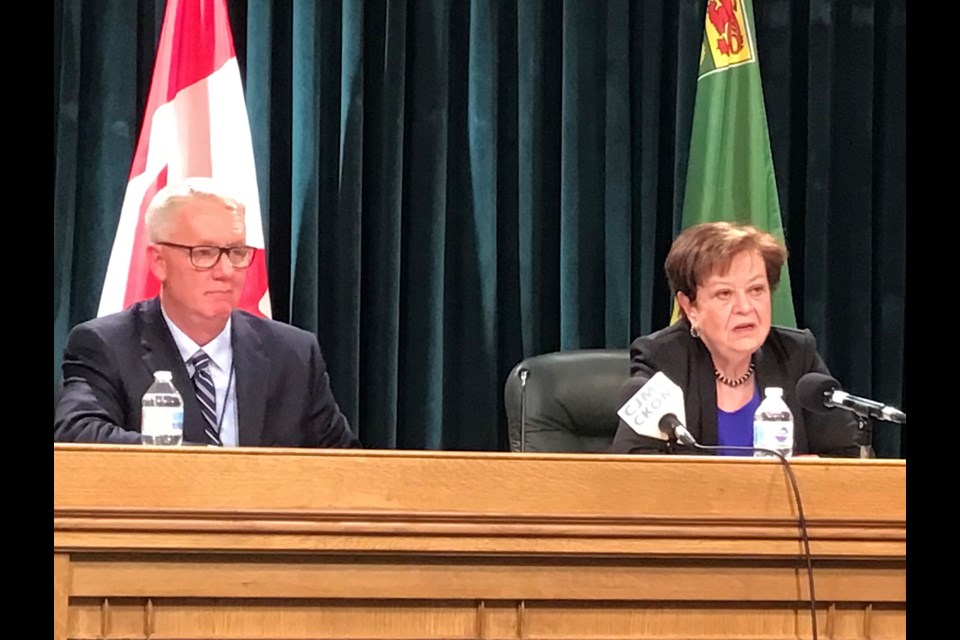REGINA - Second quarter numbers are out and Saskatchewan is looking at improved surplus numbers to what was previously announced.
Finance Minister Donna Harpauer reported the province is forecasting a surplus of $1.1 billion for 2022-23, up by $50.1 million from from the first quarter forecast. It also represents a $1.6 billion improvement from budget.
"At midyear our province's strong economy and resources that belong to all Saskatchewan people are contributing to the province's bottom line," Harpauer said in speaking to reporters Tuesday morning.
"Revenue is forecast to be up from budget, consistent with the first quarter forecast. This is largely the result of high potash and oil prices, as well as higher taxation revenue which reflects solid economic growth. As we announced in the summer, we are going to use higher-than-expected revenue to help people and businesses address higher costs due to inflation, while reducing the province's debt. That is growth that works for everyone."
Here are some numbers from the second quarter update:
Revenue is forecast at $19.5 billion, up $336.9 million from the first quarter forecast, and up $2.4 billion from budget. The increase is due mainly to a $1.4 billion rise in non-renewable resource revenue over budget, a result of higher potash and oil prices.
Taxation revenue is forecast to be up $1 billion from budget, with higher tax and PST revenue.
There is a projected $481.2 million decrease from budget for net income from Government Business Enterprises, attributed to lower investment income and higher natural gas prices.
Expenses are forecast at $18.4 billion, up $286.8 million from the first quarter and $795 million from budget, largely due to the $450 million spent for the Saskatchewan Affordability Tax Credit payments and $204.3 million in expected increases in 2021 and 2022 Saskatchewan Crop Insurance indemnities and AgriStability benefits paid.
Saskatchewan is also expecting real Gross Domestic Product to grow 5.3 per cent in 2022. It was noted Saskatchewan's economy is expected to lead the provinces in growth in 2022 and 2023, with an increase of 20,400 jobs in the first ten months of 2022.
While the financial numbers are good, there are no further new affordability measures coming from the government, at least not right now.
The province reports the Saskatchewan Affordability Tax Credit $500 cheques were mailed to Saskatchewan residents 18 years of age and older this month, but Harpauer confirmed a number of $500 cheques have still to go out.
Most of the remaining ones will be sent in the next week to 10 days, though there will be more of a lag for late filers.
“I heard there was a bit of a printer glitch because of the volume of cheques but I’m assuming we’ve got that fixed,” she said.
There have been opposition calls for the government to claw back its power and energy rate increases that have come in. Harpauer was asked about pressures facing consumers on gas prices or electric bills, but she responded that the $500 “directed to people to use at their discretion was a better avenue.”
When asked if there was any consideration given to rethink their position given recent events, Harpauer said “not at this time,” adding that "strengthening the debt position that we’re in was a better decision because it also helps us in future budgets.” The province announced in its September update it would be paying down $1 billion in debt.
As for what might happen by the time the budget is delivered next spring, Harpauer was cautious, noting they did see oil “already dropping significantly from where it peaked earlier in the year.” And while potash has been more steady, “we still see more softening in potash.”
Regarding her own top concerns going into the next budget, “I worry about the expectations that we can start to incorporate the resource revenue highs into operating, and the anticipation that this money will last forever. I think we need to be very mindful of our expenditure increases.”
In response to the budget update, Opposition Critic Trent Wotherspoon was once again critical that more was not done on affordability. He was critical there were “no new measures to provide relief in a meaningful way."
“The reality is that Saskatchewan people are facing the worst cost of living challenge we’ve faced in over a generation,” said Wotherspoon.
He also pointed to the “very high windfall revenues” the province is seeing at the moment.
“That’s a positive thing. But the disconnect is the government is not rising to the challenge that Saskatchewan people are facing. They’re leaving people drowning, they’re leaving people in horrible hardship.”





